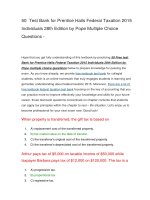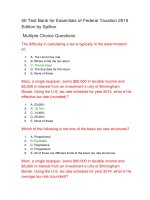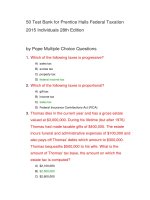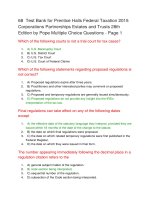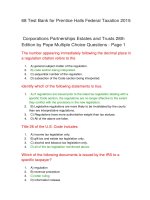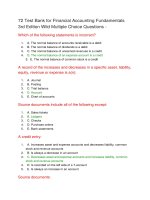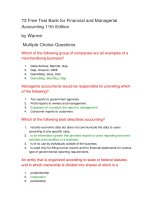77 test bank for concepts in federal taxation 2015 22nd đề trắc nghiệm có đáp án
Bạn đang xem bản rút gọn của tài liệu. Xem và tải ngay bản đầy đủ của tài liệu tại đây (58.89 KB, 19 trang )
77 Test Bank for Concepts in Federal Taxation 2015
22nd Edition by Murphy Multiple Choice Questions Jim and Anna are married and have a 2014 taxable income of
$280,000. They also received $20,000 of tax-exempt income. Their
effective tax rate is:
1.
2.
3.
4.
5.
a. 22.7%
b. 22.8%
c. 24.8%
d. 33.0%
e. 35.0%
Shara's 2014 taxable income is $42,000 before considering
charitable contributions. Shara is a single individual. She makes a
donation of $5,000 to the American Heart Association in December
2014. By how much did Shara's marginal tax rate decline simply
because of the donation?
1.
2.
3.
4.
5.
a. 0%
b. 7%
c. 3%
d. 5%
e. 10%
Based on the definition given in Chapter 1 of the text, which of the
following is a tax? I. A registration fee paid to the state to get a car
license plate. II. 2% special sales tax for funding public education.
III. A special property tax assessment for installing sidewalks in the
taxpayer's neighborhood. IV. An income tax imposed by Chicago on
persons living or working within the city limits.
1.
2.
3.
4.
5.
a. Only statement I is correct.
b. Only statement III is correct.
c. Only statement IV is correct.
d. Statements I and IV are correct.
e. Statements II and IV are correct.
Jered and Samantha are married. Their 2014 taxable income is
$90,000 before considering their mortgage interest deduction. If the
mortgage interest totals $10,000 for 2014, what are the tax savings
attributable to their interest deduction?
1.
2.
3.
a. $ 1,500
b. $ 2,500
c. $ 2,800
4.
5.
d. $ 3,300
e. $10,000
Lee's 2014 taxable income is $88,000 before considering charitable
contributions. Lee is a single individual. She makes a donation of
$10,000 to the American Heart Association in December 2014. By
how much did Lee's marginal tax rate decline simply because of the
donation?
1.
2.
3.
4.
5.
a. 0%
b. 10%
c. 3%
d. 5%
e. 8%
Heidi and Anastasia are residents of the mythical country of
Wetland. Heidi pays $1,500 income tax on taxable income of
$6,000. Anastasia pays income tax of $21,000 on taxable income of
$72,000. The income tax structure is I. Progressive. II. Proportional.
III. Regressive. IV. Value-added. V. Marginal.
1.
2.
3.
4.
5.
a. Only statement I is correct.
b. Only statement II is correct.
c. Only statement III is correct.
d. Only statement V is correct.
e. Statements II and IV are correct.
Katie pays $10,000 in taxdeductible property taxes. Katie’s marginal
tax rate is 25%, average tax rate is 24%, and effective tax rate is
20%. Katie's tax savings from paying the property tax is:
1.
2.
3.
4.
5.
a. $ 1,600
b. $ 2,000
c. $ 2,400
d. $ 2,500
e. $10,000
If a taxpayer has a choice of receiving income in the current year
versus the following year, which of the following tax rates is
important in determining the year in which he should include the
income?
1.
2.
3.
4.
a. Average.
b. Effective.
c. Composite.
d. Marginal.
Katarina, a single taxpayer, has total income from all sources of
$100,000 for 2014. Her taxable income after taking into
consideration $25,000 in deductions and $10,000 in exclusions is
$65,000. Katarina’s tax liability is $12,106. What are Katarina's
marginal, average, and effective tax rates?
1.
2.
3.
4.
5.
a. 28% marginal; 18.6% average; 18.6% effective.
b. 25% marginal; 16.1% average; 16.1% effective.
c. 25% marginal; 16.1% average; 18.6% effective.
d. 25% marginal; 18.6% average; 16.1% effective.
e. 28% marginal; 16.1% average; 18.6% effective.
Andrea is single and has a 2014 taxable income of $199,800. She
also received $15,000 of tax-exempt income. Andrea's average tax
rate is:
1.
2.
3.
4.
5.
a. 22.8%
b. 23.5%
c. 24.9%
d. 28.5%
e. 33.0%
Which of the following are included among Adam Smith's criteria for
evaluating a tax? I. Convenience. II. Fairness. III. Neutrality. IV.
Economy.
1.
2.
3.
4.
5.
a. Statements I and II are correct.
b. Statements I, II, and III are correct.
c. Statements I and IV are correct.
d. Statements II and III are correct.
e. Statements I, II, III, and IV are correct.
Elrod is an employee of Gomez Inc. During 2014, Elrod receives a
salary of $120,000 from Gomez. What amount should Gomez
withhold from Elrod's salary as payment of Elrod's social security
and medicare taxes?
1.
2.
3.
4.
5.
a. $7,440.00
b. $7,803.40
c. $8,422.65
d. $8,988.00
e. $9,180.00
Adam Smith's concept of vertical equity is found in a tax rate
structure that is
1.
2.
a. Regressive.
b. Proportional.
3.
4.
5.
c. Horizontal.
d. Progressive.
e. Economical.
Alan is a single taxpayer with a gross income of $88,000, a taxable
income of $66,000, and an income tax liability of $12,356. Josh also
has $8,000 of tax-exempt interest income. What are Alan's
marginal, average, and effective tax rates?
1.
2.
3.
4.
a. 25% marginal; 16.7% average; 18.7% effective.
b. 28% marginal; 15.9% average; 21.5% effective.
c. 28% marginal; 16.7% average; 21.5% effective.
d. 25% marginal; 18.7% average; 16.7% effective.
Vertical equity: I. means that those taxpayers who have the greatest
ability to pay the tax should pay the greatest proportion of the tax. II.
means that two similarly situated taxpayers are taxed the same. III.
is reflected in the progressive nature of the federal income tax
system. exists when Avis, a single individual with 4 dependent
children, and Art, a single. IV. individual with no dependents, both
pay $2,400 income tax on equal $26,000 annual salaries.
1.
2.
3.
4.
5.
a. Statements III and IV are correct.
b. Statements II and III are correct.
c. Statements I and III are correct.
d. Only statement IV is correct.
e. Statements I, II, III, and IV are correct.
Which of the following payments meets the IRS definition of a tax?
1.
2.
3.
4.
5.
a. A fee paid on the value of property transferred from one individual to
another by gift.
b. A one-time additional property tax assessment to add a sidewalk to the
neighborhood.
c. A fee paid on the purchase of aerosol producing products to fund ozone
research.
d. A fee for a sticker purchased from a city that must be attached to garbage
bags before the city garbage trucks will pick up the bags.
e. All of the above meet the definition of a tax.
Taxpayer A pays tax of $3,300 on taxable income of $10,000 while
taxpayer B pays tax of $6,600 on $20,000. The tax is a
1.
2.
3.
4.
a. proportional tax.
b. regressive tax.
c. progressive tax.
d. horizontal tax.
Which of the following statement is/are included in Adam Smith’s
four requirements for a good tax system? I. Changes in the tax law
should be made as needed to raise revenue and for proper
administration. II. A tax should be imposed in proportion to a
taxpayer's ability to pay. III. A taxpayer should be required to pay a
tax when it is most likely to be convenient for the taxpayer to make
the payment. IV. The government must collect taxes equal to it’s
expenses.
1.
2.
3.
4.
5.
a. Statements I and II are correct.
b. Statements I and IV are correct.
c. Statements II and III are correct.
d. Statements II and IV are correct.
e. Statements III and IV are correct.
Jaun plans to give $5,000 to the American Diabetes Association.
Jaun's marginal tax rate is 28%. His average tax rate is 25%. Jaun's
after-tax cost of the contribution is
1.
2.
3.
4.
5.
a. $1,250
b. $1,400
c. $3,600
d. $3,750
e. $5,000
Marie earns $80,000 as a sales manager for Household Books.
How much Social Security and medicare tax does Marie have to
pay?
1.
2.
3.
4.
a. $ 4,960.00
b. $ 6,120.00
c. $ 6,400.00
d. $12,240.00
A state sales tax levied on all goods and services sold is an
example of a
1.
2.
3.
4.
a. progressive tax.
b. regressive tax.
c. proportional tax.
d. value added tax.
Bob and Linda are married and have a 2014 taxable income of
$280,000. They also received $20,000 of tax-exempt income. Their
marginal tax rate is:
1.
a. 23.1%
2.
3.
4.
5.
b. 24.8%
c. 28.0%
d. 33.0%
e. 35.0%
Pay-as-you-go withholding is consistent with Adam Smith's criteria
of
1.
2.
3.
4.
5.
a. Certainty.
b. Convenience.
c. Economy.
d. Fairness.
e. Transparency.
Frank and Fran are married and have a 2014 taxable income of
$280,000. They also received $20,000 of tax- exempt income. Their
average tax rate is:
1.
2.
3.
4.
5.
a. 23.1%
b. 24.4%
c. 25.3%
d. 33.0%
e. 35.0%
A tax provision has been discussed that would add an additional
marginal tax rate of 39% to be applied to an individual's taxable
income in excess of $800,000. If this provision were to become law,
what overall distributional impact would it have on our current
income tax system?
1.
2.
3.
4.
5.
a. Proportional.
b. Regressive.
c. Progressive.
d. Disproportional.
e. None of the above.
Which of the following payments would not be considered a tax?
1.
2.
3.
a. An assessment based on the selling price of the vehicle.
b. A local assessment for new sewers based on the amount of water used.
c. A local assessment for schools based on the value of the taxpayer's
property.
4. d. A surcharge based upon the amount of income tax already calculated.
Employment taxes are
1.
2.
3.
a. revenue neutral.
b. regressive .
c. value-added.
4.
5.
d. progressive.
e. proportional.
When planning for an investment that will extend over several
years, the ability to predict how the results of the investment will be
taxed is important. This statement is an example of
1.
2.
3.
4.
5.
a. Certainty.
b. Transparency
c. Equality.
d. Neutrality.
e. Fairness.
Greg pays sales tax of $7.20 on the purchase of a lamp for $120.
Michelle paid sales tax of $9 on the purchase of a similar lamp for
$150. Greg's taxable income for the current year is $40,000.
Michelle's taxable income is $55,000. I. The structure of the sales
tax is progressive if based on taxable income. II. The structure of
the sales tax is proportional if based on sales price.
1.
2.
3.
4.
a. Only statement I is correct.
b. Only statement II is correct.
c. Both statements are correct.
d. Neither statement is correct.
According to the IRS definition, which of the following is not a
characteristic of a tax?
1.
2.
3.
4.
a. The payment to the governmental authority is required by law.
b. The payment relates to the receipt of a specific benefit.
c. The payment is required pursuant to the legislative power to tax.
d. The purpose of requiring the payment is to provide revenue to be used for
the public or governmental purposes.
Which of Adam Smith's requirements for a good tax system best
supports the argument that the federal income tax rate structure
should be progressive?
1.
2.
3.
4.
5.
a. Certainty.
b. Convenience.
c. Equality.
d. Neutrality.
e. Sufficiency.
Terry is a worker in the country Pretoria. His salary is $46,000 and
his taxable income is $52,000. Pretoria imposes a Worker Tax as
follows: Employers withhold a tax of 20% of all wages and salaries.
If taxable income as reported on the employee's income tax return
is greater than $50,000, an additional 10% tax is withheld on all
income. Terry's marginal tax rate is:
1.
2.
3.
4.
a. 0%
b. 10%
c. 20%
d. 30%
Which of the following payments is a tax? I. Artis paid the IRS a
penalty of $475 (above his $11,184 income tax balance due)
because he had significantly underpaid his estimated income tax. II.
Lindsey paid $135 to the State of Indiana to renew her CPA license.
III. Carrie paid a $3.50 toll to cross the Mississippi River. IV. Darnell
paid $950 to the County Treasurer's Office for an assessment on
his business equipment.
1.
2.
3.
4.
5.
a. Only statement IV is correct.
b. Only statement III is correct.
c. Statements II and IV are correct.
d. Statements I, II, and III are correct.
e. Statements I, II, III, and IV are correct.
Horizontal equity: I. means that those taxpayers who have the
greatest ability to pay the tax should pay the greatest proportion of
the tax. II. means that two similarly situated taxpayers are taxed the
same. III. is reflected in the progressive nature of the federal
income tax system. exists when Avis, a single individual with 4
dependent children, and Art, a single. IV. individual with no
dependents, both pay $2,400 income tax on equal $26,000 annual
salaries.
1.
2.
3.
4.
5.
a. Statements III and IV are correct.
b. Statements II and III are correct.
c. Statements I and III are correct.
d. Only statement IV is correct.
e. Statements I, II, III, and IV are correct.
Jessica is single and has a 2014 taxable income of $199,800. She
also received $15,000 of tax-exempt income. Jessica's marginal tax
rate is:
1.
2.
3.
4.
5.
a. 22.8%
b. 23.5%
c. 25.0%
d. 28.0%
e. 33.0%
The Federal income tax is a
1.
2.
3.
4.
5.
a. revenue neutral tax.
b. regressive tax.
c. value-added tax.
d. progressive tax.
e. form of sales tax.
Maria is single and has a 2014 taxable income of $199,800. She
also received $15,000 of tax-exempt income. Maria's effective tax
rate is:
1.
2.
3.
4.
5.
a. 22.8%
b. 23.2%
c. 25.3%
d. 28.0%
e. 33.0%
Which of the following payments meets the IRS definition of a tax?
1.
2.
3.
4.
a. Sewer fee charged added to a city trash collection bill.
b. A special assessment paid to the county to pave a street.
c. A levy on the value of a deceased taxpayer's estate.
d. Payment of $300 to register an automobile. The $300 consists of a $50
registration fee and $250 based on the weight of the auto.
77 Free Test Bank for Concepts in Federal Taxation
2015 22nd Edition by Murphy Multiple Choice Questions
- Page 2
A property tax: I. is levied on the value of property. II. is referred to
as ad valorem. III. on personal property is more common than a tax
on real property. IV. is based upon assessed value rather than
actual transactions.
1.
2.
3.
4.
a. Only statement I is correct.
b. Statements II and III are correct.
c. Statements I, II, and IV are correct.
d. Statements I, II, III, and IV are correct.
Which of the following is/are categorized as itemized deduction(s)?
I. Trade or business expenses. II. Rental expenses. III. Property
taxes on personal residence. IV. Investment interest expense.
1.
2.
3.
4.
a. Only statement I is correct.
b. Only statement IV is correct.
c. Statements I and III are correct.
d. Statements III and IV are correct.
5.
e. Statements I, II, and IV are correct.
Tax planning involves the timing of income and deductions. General
rules of thumb to follow when planning include I. putting income into
the year with the lowest marginal tax rate. II. deferring deductions.
1.
2.
3.
4.
a. Only statement I is correct.
b. Only statement II is correct.
c. Both statements are correct.
d. Neither statement is correct.
Betty hires Sam to prepare her federal income tax return. In
preparing the return, Sam erroneously decided to exclude
consulting fees because he estimated that Betty's expenses should
have exceeded the income she received. If the IRS detects Betty's
underpayment of tax, what is the likely result? I. Betty is liable for
payment of the tax due plus interest and a negligence penalty. II.
Sam is liable for payment of Betty's negligence penalty. Betty is
liable for the payment of the tax due plus interest.
1.
2.
3.
4.
a. Only statement I is correct.
b. Only statement II is correct.
c. Both statements are correct
d. Neither statement is correct
Ordinary income is I. the common type of income that individuals
and businesses earn. II. receives no special treatment under tax
laws. III. the character of the gain from the sales of shares of stock
held more than one year
1.
2.
3.
4.
5.
a. Only statement I is correct.
b. Only statement II is correct.
c. Statements I and II are correct.
d. Statements I and III are correct.
e. Statements I, II, and III are correct.
All tax practitioners who prepare tax returns for a fee are subject to
which of the following? I. IRS Circular 230; II. AICPA Code of
Professional Conduct; III. Statements on Standards for Tax
Services; IV. American Bar Association Code of Professional
Conduct
1.
2.
3.
4.
5.
a. Only statement I is correct.
b. Statements I, II, and III are correct.
c. Statements II and III are correct.
d. Statements II and IV are correct.
e. Statements I, II, III, and IV are correct.
How much additional Social Security tax does Connie pay in 2014
on her $10,000 Christmas bonus? Her total earnings for the year
(before the bonus) are $42,000.
1.
2.
3.
4.
a. $ 0
b. $145.00
c. $620.00
d. $765.00
Sarah owes a deductible expense that she can either pay (and
deduct) this year or next year. She is in the 25% marginal tax rate
bracket. Which of the following statements about this payment
is/are correct? I. Deductions should always be taken in the current
year. Sarah should pay the expense this year. II. If Sarah expects to
be in the 28% marginal tax rate bracket next year, she should pay
the expense next year.
1.
2.
3.
4.
a. Only statement I is correct.
b. Only statement II is correct.
c. Both statements are correct.
d. Neither statement is correct.
Tax evasion usually involves certain elements. Which of the
following are elements necessary for tax evasion to occur? I.
Nondisclosure of the relevant facts on the taxpayer’s tax return. II.
Underpayment of tax. III. Avoiding detection by the IRS. IV.
Willfulness on the part of the taxpayer. V. An affirmative act by the
taxpayer to misrepresent.
1.
2.
3.
4.
5.
a. Statements I, II, and III are correct.
b. Statements I, II, IV, and V are correct.
c. Statements I and III are correct.
d. Only statement IV is correct.
e. All of the five listed elements are correct.
Samantha is a self-employed electrician. During 2014, her net selfemployment income is $120,000. What is Samantha's selfemployment tax?
1.
2.
3.
4.
5.
a. $15,570.00
b. $15,606.80
c. $16,845.30
d. $17,988.00
e. $18,360.00
Alice is a plumber and collector of rare stamps. Instead of always
receiving cash payments for her work, she occasionally has her
customers send their payments to a stamp broker. The broker then
makes stamp purchases on Alice's behalf and mails the stamps to
her. Alice never reports the value of the stamps received as income
on her tax return. I. Alice's actions are a form of tax evasion. II.
Alice's actions are subject to payment of tax, interest, and penalty if
detected by the IRS.
1.
2.
3.
4.
a. Only statement I is correct.
b. Only statement II is correct.
c. Both statements are correct.
d. Neither statement is correct.
Which of the following is an example of tax evasion?
1.
2.
3.
4.
5.
a. Beth invests money in tax exempt municipal bonds instead of corporate
bonds.
b. Bryan uses the cafeteria plan offered by his employer to fund pension plan
contributions for his retirement.
c. Bauregard, a very wealthy 87-year-old individual, gives bonds to each of his
grandchildren so that the interest income on them would be taxed at a lower
tax rate.
d. Bertha won $500 cash in an amateur mud-wrestling contest but doesn't
report it on her tax return.
e. All of the above are examples of tax evasion.
Exemption amounts and itemized deductions are two types of
reductions used to calculate taxable income. Which of the following
are characteristics of these types of deductions? I. Taxpayers
deduct the larger of itemized deductions or the standard deduction.
II. Exemption amounts are dependent on amounts of expenditures
for dependents. Deductions for adjusted gross income are limited to
those incurred in a trade or. III. business, incurred in the earning of
income, and certain specifically allowed personal
1.
2.
3.
4.
5.
a. Only statement III is correct.
b. Statements I and II are correct.
c. Statements I and III are correct.
d. Statements II and III are correct.
e. Statements I, II, and III are correct.
Which of the following are types of IRS examinations? I. Information
matching program. II. Office examination. III. Field examination. IV.
Revenue agent report.
1.
2.
3.
a. Statements II and III are correct.
b. Only statement III is correct.
c. Statements I and IV are correct.
4.
5.
d. Statements I, II and III are correct.
e. Only statement II is correct.
Adjusted gross income (AGI): I. is used to provide limitations on
certain deductions from AGI. II. is unique to the individual income
tax formula. III. is the result before subtracting certain allowable
personal expenditures from gross income.
1.
2.
3.
4.
5.
a. Only statement I is correct.
b. Only statement II is correct.
c. Only statement III is correct.
d. Statements I and II are correct.
e. Statements I, II, and III are correct.
For 2014, Nigel and Lola, married taxpayers without children,
calculated their total allowable itemized deductions to be $17,100.
Accordingly, Nigel and Lola file jointly and should deduct from
adjusted gross income. I. the standard deduction amount of
$12,200. II. total itemized deductions equal to $17,100. III. one
personal and one dependency exemption amount. IV. exemption
amounts totaling $7,900.
1.
2.
3.
4.
5.
a. Only statement I is correct.
b. Statements I and IV are correct.
c. Statements I, III, and IV are correct.
d. Statements II and IV are correct.
e. Statements I, II, III, and IV are correct.
The calculation of an individual's income tax includes certain
deductions for adjusted gross income. The following are examples
of this class of deductions: I. Trade or business expenses. II. Rental
expenses. III. Interest on student loans. IV. Investment interest
1.
2.
3.
4.
5.
a. Statements I and II are correct.
b. Statements I, II, and III are correct.
c. Only statement I is correct.
d. Only statement III is correct.
e. Statements I, II, III, and IV are correct.
How much additional Social Security tax does Betty pay in 2014 on
her $10,000 Christmas bonus? Her total earnings for the year
(before the bonus) are $100,000.
1.
2.
3.
4.
a. $145.00
b. $269.20
c. $461.20
d. $641.00
5.
e. $765.00
Tax planning involves the timing of income and deductions. General
rules of thumb to follow when planning include I. deferring
recognition of income. II. putting deductions into the year with
highest marginal tax rate.
1.
2.
3.
4.
a. Only statement I is correct.
b. Only statement II is correct.
c. Both statements are correct.
d. Neither statement is correct.
Joy receives a used car worth $13,000 from her uncle as a
graduation present. As a result of the gift I. Joy will have $13,000 of
taxable income. II. Joy’s uncle’s gift will subject him to the gift tax.
1.
2.
3.
4.
a. Only statement I is correct.
b. Only statement II is correct.
c. Both statements are correct.
d. Neither statement is correct.
Phyllis is an electrician employed by Bogie Company. Phil is a selfemployed electrician. During the current year, Phyllis's salary is
$75,000 and Phil's net self-employment income is $75,000. Which
of the following statements about the Social Security and selfemployment taxes paid is/are correct? I. Phil's self-employment tax
is greater than the Social Security tax paid on Phyllis's income. II.
Phil pays more self-employment tax than Phyllis pays in Social
Security tax. III. Phil and Phyllis pay the same
1.
2.
3.
4.
5.
a. Only statement I is correct.
b. Only statement I is correct.
c. Only statement IV is correct.
d. Statements I and III are correct.
e. Statements II and IV are correct.
Which of the following statements is/are correct? I. There is a
minimum allowable standard deduction from adjusted gross income
of individuals. II. Corporations are allowed deductions from adjusted
gross income. III. Corporations are allowed a standard deduction.
IV. Personal exemptions of individuals are deductible for adjusted
gross income.
1.
2.
3.
4.
a. Only statement I is correct.
b. Only statement II is correct.
c. Statements II and IV are correct.
d. Statements I and IV are correct.
5.
e. Statements I and III are correct.
Tax planning involves the timing of income and deductions. General
rules of thumb to follow when planning include: I. putting income
into the year with the lowest marginal tax rate. II. deferring
recognition of income.
1.
2.
3.
4.
a. Only statement I is correct.
b. Only statement II is correct.
c. Both statements are correct.
d. Neither statement is correct.
The return selection program designed to select returns with the
highest probability of errors is
1.
2.
3.
4.
5.
a. The TCMP.
b. The DIF program.
c. The special audit program.
d. The document perfection program.
e. The information-matching program.
Trang is in the 15% marginal tax bracket in the current year. She
owes a $10,000 bill for business expenses. Since she reports
taxable income on a cash basis, she can deduct the $10,000 in
either this year or next year, depending on when she makes the
payment. She can pay the bill at any time before January 31 of next
year, without incurring the normal 12% interest charge. She expects
to be in the 25% marginal bracket next year. Without considering
the time value of money, what are her tax savings if she p
1.
2.
3.
4.
5.
a. Current year $1,000.
b. Current year $1,500.
c. Next year $1,000.
d. Next year $2,500.
e. Next year $1,500.
Sally is an electrician employed by Bogie Company. Sam is a selfemployed electrician. During the current year, Sally's salary is
$85,000 and Sam's net self-employment income is $85,000. Which
of the following statements about the Social Security and selfemployment taxes paid is/are correct? I. Sam's self-employment tax
is greater than the Social Security tax paid on Sally's income. II.
Sam and Sally pay the same amount of tax.
1.
2.
3.
a. Only statement I is correct.
b. Only statement II is correct
c. Both statements are correct
4.
d. Neither statement is correct
Rayburn is the sole owner of a dance studio. During the current
year, his net self-employment income from the dance studio is
$50,000. What is Rayburn 's self-employment tax?
1.
2.
3.
4.
a. $3,825.00
b. $5,738.00
c. $6,200.00
d. $7,650.00
Carolyn and Craig are married. They have two children (8 years old
and 13 years old) living with them. How many dependency
exemptions are claimed on Carolyn and Craig's 2014 tax return?
1.
2.
3.
4.
5.
a. 0
b. 1
c. 2
d. 3
e. 4
Christy's 2014 tax return was audited during November 2015. The
auditor proposed additional tax due of $1,500. Christy disagreed.
What should Christy do next? I. Within 30 days, she must file a
protest. II. She must respond with a written protest letter. III. She
may respond with an oral protest.
1.
2.
3.
4.
5.
a. Only statement I is correct.
b. Only statement II is correct.
c. Only statement III is correct.
d. Statements I and III are correct.
e. Statements I and II are correct.
The term "tax law" as used in your textbook includes I. Treasury
regulations. II. College textbooks (i.e. “Concepts in Federal Income
Taxes”). III. Internal Revenue Code of 1986. IV. Tax related
decisions of a U.S. Circuit Court of Appeals.
1.
2.
3.
4.
5.
a. Only statement III is correct.
b. Statements I, III, and IV are correct.
c. Statements I and III are correct.
d. Only statement II is correct.
e. All four statements are correct
Which of the following types of taxes rely solely on "income" as the
tax base for determining the amount of tax liability? I. Sales Tax. II.
Property Tax. III. Gift Tax. IV. Social Security Tax. V. Excise Tax
1.
a. Statements I, II, III, IV, and V are correct.
2.
3.
4.
5.
b. Statements I, III, and IV are correct.
c. Statements II and IV are correct.
d. Only statement IV is correct.
e. None of the above types of taxes relies on income for its tax base.
How much additional Social Security tax does Elise pay in 2014 on
her $10,000 Christmas bonus? Her total earnings for the year
(before the bonus) are $130,000.
1.
2.
3.
4.
a. $ 0
b. $ 145
c. $ 620
d. $ 765
Sally is an electrician employed by Bogie Company. Sam is a selfemployed electrician. During the current year, Sally's salary is
$85,000 and Sam's net self-employment income is $85,000. Which
of the following statements about the Social Security and selfemployment taxes paid is/are correct? I. Sam pays more selfemployment tax than Sally pays in Social Security tax. II. Sam's
self-employment tax is equal to the Social Security tax paid on
Sally's income.
1.
2.
3.
4.
a. Only statement I is correct.
b. Only statement II correct.
c. Both statements are correct.
d. Neither statement is correct.
When property is transferred, gift and estate taxes are based on
the
1.
2.
3.
4.
5.
a. fair market value of the assets on the date of transfer.
b. replacement cost of the transferred property.
c. transferor's original cost of the transferred property.
d. transferor's adjusted basis of the transferred property.
e. fair market value less adjusted basis on the date of the transfer.
Betty hires Sam to prepare her federal income tax return. In
preparing the return, Sam erroneously decided to exclude
consulting fees because he estimated that Betty's expenses should
have exceeded the income she received. If the IRS detects Betty's
underpayment of tax, what is the likely result? I. Betty is not subject
to the negligence penalty since she relied on a professional tax
preparer and reported her income in good faith. II. Sam is liable for
payment of Betty's tax due plus interest and negligenc
1.
a. Only statement I is correct.
2.
3.
4.
b. Only statement II is correct.
c. Both statements are correct
d. Neither statement is correct
Based on the following information, what is the 2014 taxable
income for a married couple with two children? Total income
$120,000; Excludable income 2,000; Deductions for AGI 5,000;
Allowable itemized deductions
1.
2.
3.
4.
5.
a. $ 84,800 8,000
b. $ 85,200
c. $ 86,700
d. $ 89,800
e. $ 90,900
How long does a taxpayer have to file a petition with the U.S. Tax
Court after receiving a Statutory Notice of Deficiency?
1.
2.
3.
4.
5.
a. 10 days
b. 30 days
c. 90 days
d. 120 days
e. 180 days
The income tax formula for individual taxpayers is unique in that
deductions are broken into classes. I. This dichotomy of deductions
results in an intermediate income number called adjusted gross
income (AGI). II. One class of deductions is called exclusions from
income. III. One class of deductions is called deductions for
adjusted gross income. IV. Expenses qualifying as deductions for
adjusted gross income are not limited by the income of the
taxpayer.
1.
2.
3.
4.
5.
a. Statements III and IV are correct.
b. Statements II and III are correct.
c. Statements I, III and IV are correct.
d. Only statement IV is correct.
e. Statements I, II, III, and IV are correct.
An excise tax: I. is levied on the value of property. II. is levied on the
quantity of the product or service. III. differs from an sale tax,
because a sales tax is imposed on the value of property.
1.
2.
3.
4.
a. Only statement I is correct.
b. Only statement II is correct.
c. Statements I and II are correct.
d. Statements II and III are correct.
5.
e. Statements I, II, and III are correct.
